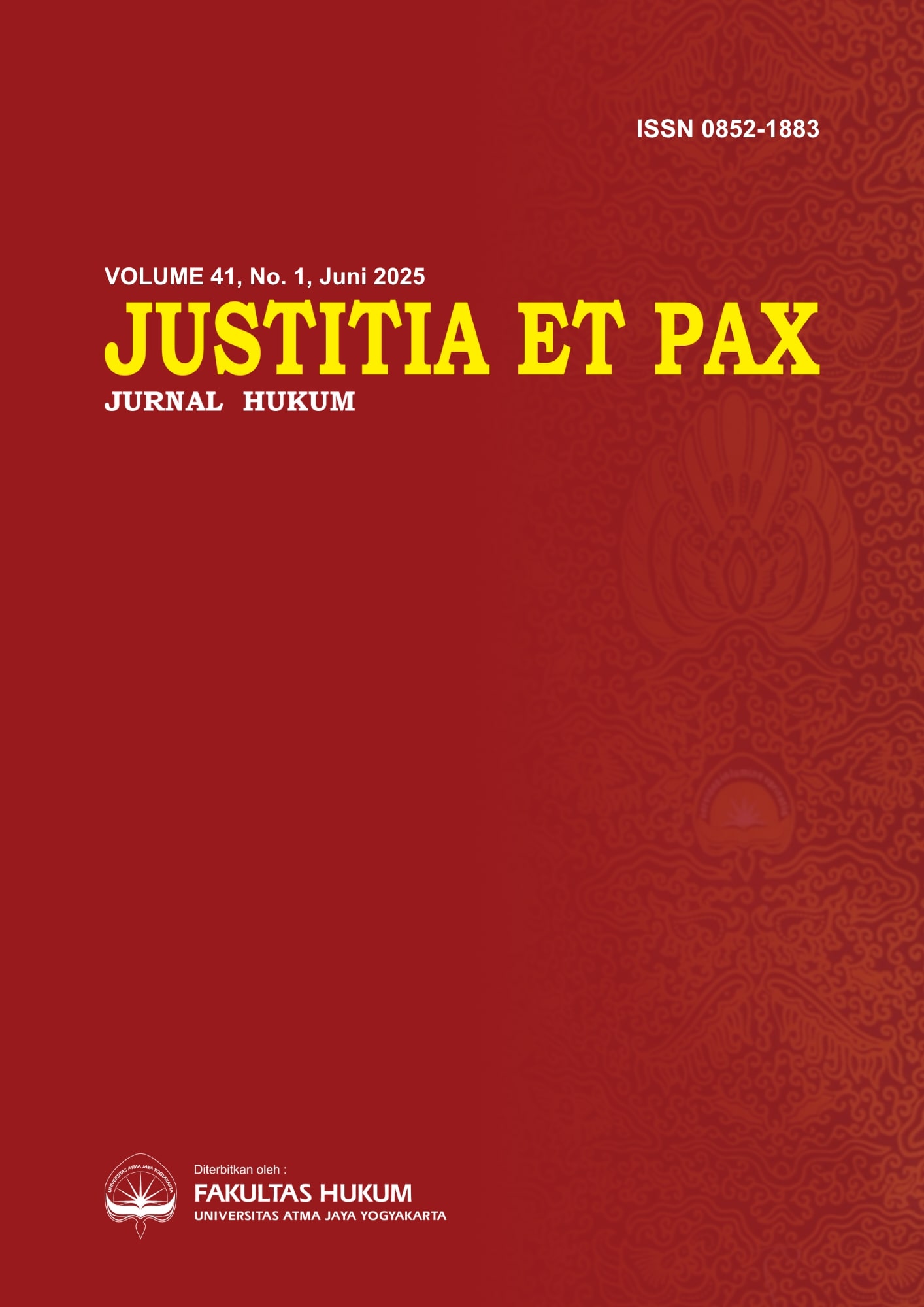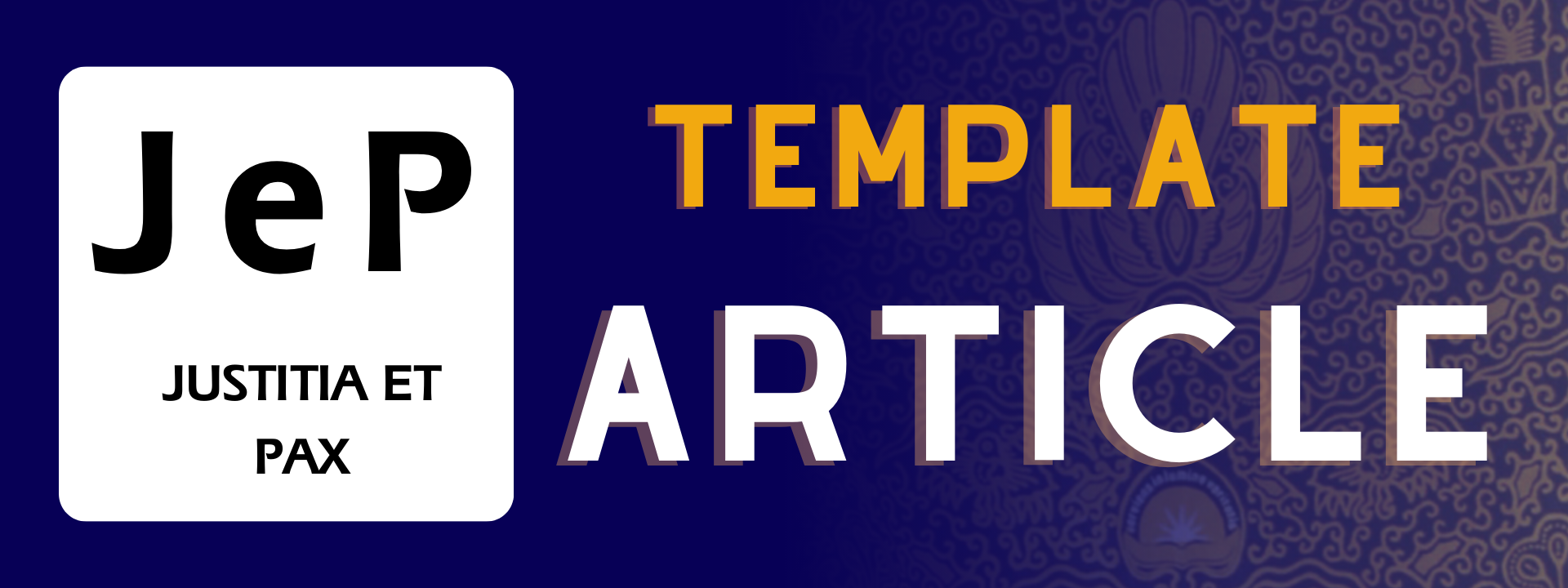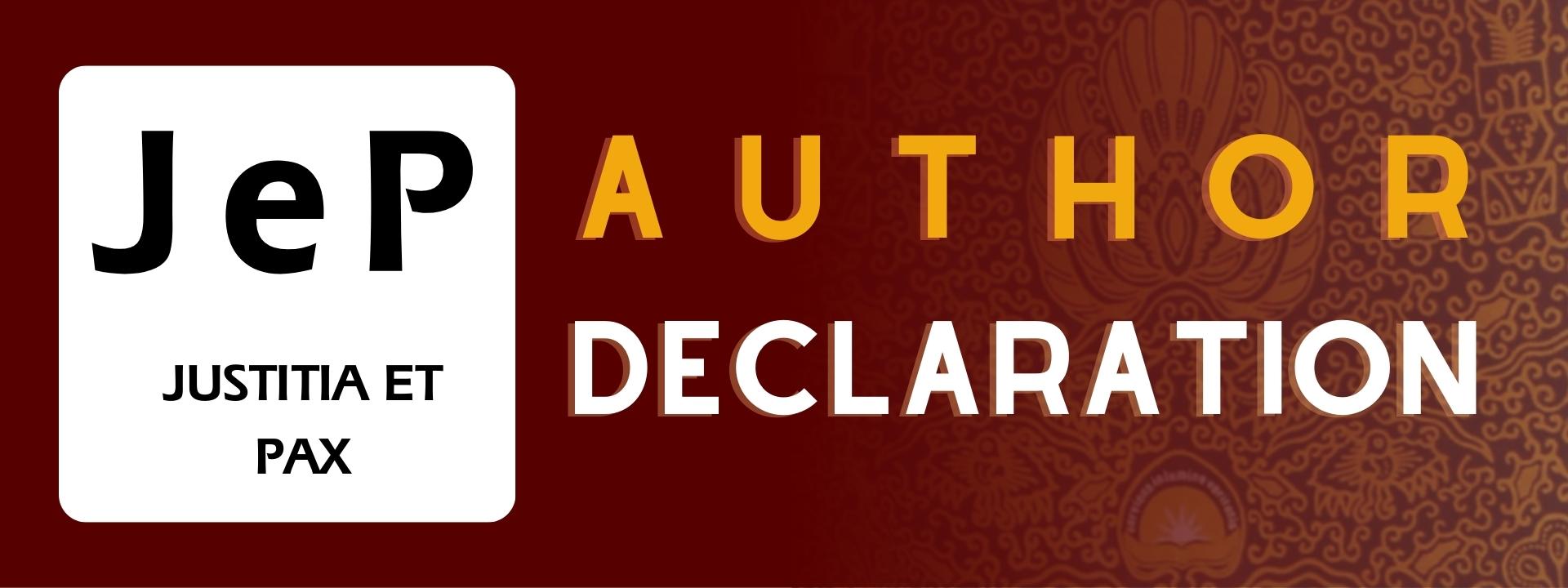JUDICIAL REVIEW OF CONSTITUTIONAL COURT DECISION NO. 90/PUU-XXI/2023 CONCERNING AGE LIMITS FOR PRESIDENTIAL AND VICE-PRESIDENTIAL CANDIDATES
DOI:
https://doi.org/10.24002/jep.v41i1.9553Keywords:
Constitutional Court, Equity, Judge's ChoiceAbstract
The Constitutional Court is an organization of legal power which, in view of the constitution, has a legal capability to maintain regulation and equity. Regulation Number 24 of 2003 makes sense of that the obligations and elements of the Constitutional Court are to deal with established matters in regards to specific protected matters to shield the constitution so it is carried out dependably as per the desire of individuals and majority rule beliefs. In protecting the constitution, obviously, sacred appointed authorities are required who have information and skill in state organization as well as a promise to executing and managing state life as per the passages of the constitution, so every choice gave by the Constitutional Court is a legitimate item that doesn't go external the passageways of the constitution, so the actual constitution is naturally kept up with. This examination is spurred by the significant job of the Constitutional Court in giving over choices since it is as per Article 10 of Regulation No. 24 of 2003 concerning the Constitutional Court, the choice of the Constitutional Court is conclusive and has restricting legitimate power. The overall population, state directors, and all parts of the country trust that the Constitutional Court judges will really complete their capabilities, obligations and commands as per the Constitution, so through Constitutional Appointed authorities who have a statesmanlike soul, the Constitutional Court can create choices that can give a feeling of equity. in the midst of society. Keywords: Equity, Judge's Choice, Constitutional Court.
References
Books
Hadita, C., 2021, Pancasila: Perspektif Ketatanegaraan Dan Paradigma Ajaran Islam, Penerbit Enam Media, Medan.
Santoso, Topo Dan Ida Budhiati, 2019, Pemilu Di Indonesia Kelembagaan, Pelaksanaan, Dan Pengawasan, Sinar Grafika, Jakarta.
Journals
Agung, Bayu Adji, et.al., “Konstitusionalitas Perubahan Usia Calon Presiden Dan Calon Wakil Presiden Dalam Negara Hukum Demokrasi”, Jurnal Riset Ilmiah, Vol. 3, No. 1, 2024.
Alfarisyi, M. D., et.al., “Meningkatkan Partisipasi Politik Masyarakat Pada Pemilu Melalui Pendidikan Demokrasi”, Jurnal Kajian Hukum Dan Pendidikan Kewarganegaraan, Vol. 1, No. 1, 2022.
Atika Wahyuni Dekananda dan Akmaluddin Syahputra, “Tinjauan Fiqh Siyasah Terhadap Putusan Mahkamah Konstitusi No. 90/Puu-Xxi/2023 Tentang Batas Usia Capres Dan Cawapres”, Jurnal Ilmu Hukum, Humaniora Dan Politik (Jihhp), Vol 4, No. 3, 2024.
Azizzi, M. G., “Tinjauan Yuridis Terhadap Kewenangan Kip Dalam Melaksanakan Pilkada Di Aceh (Studi Kajian Terhadap Uupa Dan Undang-Undang Nomor 6 Tahun 2020 Tentang Pemilihan Gubernur, Bupati, Dan Walikota)”, Uin Ar-Raniry Fakultas Syariah Dan Hukum, 2023.
Kaputeni, S. J., “Implementasi Fungsi Partai Politik Sebagai Sarana Rekrutmen Politik (Studi Pada Partai Nasdem Halmahera Utara Dalam Pelaksanaan Pilkada 2020)”, Jurnal Ilmu Politik, Vol. 10, No. 2, 2021.
Khobiburrohma, E. N., et.al., “Penerapan Sistem Merit Dalam Birokrasi Indonesia Untuk Mewujudkan Good Governance, Transparansi”, Jurnal Ilmiah Ilmu Administrasi, Vol. 3, No. 2, 2020.
Koswara, W., et.al., “Analisis Yuridis Pemberhentian Hakim Mahkamah Konstitusi Oleh Dewan Perwakilan Rakyat Republik Indonesia Dihubungkan Dengan Undang-Undang Nomor 7 Tahun 2020 Tentang Perubahan Ketiga Atas Undang-Undang Nomor 24 Tahun 2003 Tentang Mahkamah Konstitusi”, Unes Law Review, Vol. 6, No. 1, 2023.
Naway, Dian Rizqi Oktaria, “Penyelesaian Tindak Pidana Pencemaran Nama Baik Melalui Restorative Justice”, Jurnal Kewarganegaraan, Vol. 7, No. 1, 2023.
Sabrina, S., & Khalid, K., “Analisis Pemberhentian Hakim Mahkamah Konstitusi Aswanto Oleh Dewan Perwakilan Rakyat Ditinjau Dari Ketatanegaraan Di Indonesia: Analisis Pemberhentian Hakim Mahkamah Konstitusi Aswanto Oleh Dewan Perwakilan Rakyat Ditinjau Dari Ketatanegaraan Di Indonesia”, Jurnal Repository Uin Sumatera Utara, Vol. 9, No. 2, 2023.
Sagala, E., “Rekonstruksi Regulasi Perjanjian Kawin Pasca Putusan Mahkamah Konstitusi Berbasis Nilai Keadilan Pancasila”, Universitas Islam Sultan Agung, 2023.
Subandri, Rio., “Tinjauan Yuridis Putusan Mahkamah Konstitusi Nomor 90/Puu-Xxi/2023 Tentang Persyaratan Batas Usia Pencalonan Presiden Dan Wakil Presiden”, Jurnal Kajian Ilmu Hukum Dan Politik, Vol. 2, No. 1, 2024.
Suparto, S., “Perlunya Amandemen Terhadap Pasal 24 B Ayat (1) UUD 1945 Dalam Rangka Pengawasan Terhadap Hakim Konstitusi”, Borneo Law Review, Vol. 4, No. 1, 2020, 31–44.
Syarifudin, Ateng. “Menuju Penyelenggaraan Pemerintahan Negara Yang Bersih Dan Bertanggungjawab”, Jurnal Pro Justisia, Vol. 5, 2020.
Waworuntu, S. “Tinjauan Yuridis Mengenai Hak Pilih Masyarakat Dalam Pemilihan Umum Di Indonesia Yang Belum 17 Tahun Tetapi Sudah Menikah”, Lex Administratum, Vol. 10, No. 5, 2022.
Zakaria, Adelia Amanda, et.al., “Analisis Etika Dan Moral: Skandal Korupsi Menteri Pertanian. Nusantara Journal Of Multidisciplinary Science”, Nusantara Journal Of Multidisciplinary Science, Vol. 1, No. 5, 2023.
Downloads
Published
Issue
Section
License

This work is licensed under a Creative Commons Attribution-NonCommercial-ShareAlike 4.0 International License.
Authors who publish with this journal agree to the following terms:
- Authors retain copyright and grant the journal right of first publication with the work simultaneously licensed under a Creative Commons Attribution License that allows others to share the work with an acknowledgement of the work's authorship and initial publication in this journal.
- Authors are able to enter into separate, additional contractual arrangements for the non-exclusive distribution of the journal's published version of the work (e.g., post it to an institutional repository or publish it in a book), with an acknowledgement of its initial publication in this journal.
- Authors are permitted and encouraged to post their work online (e.g., in institutional repositories or on their website) prior to and during the submission process, as it can lead to productive exchanges, as well as earlier and greater citation of published work (See The Effect of Open Access).

This work is licensed under a Creative Commons Attribution-NonCommercial-ShareAlike 4.0 International License.




















